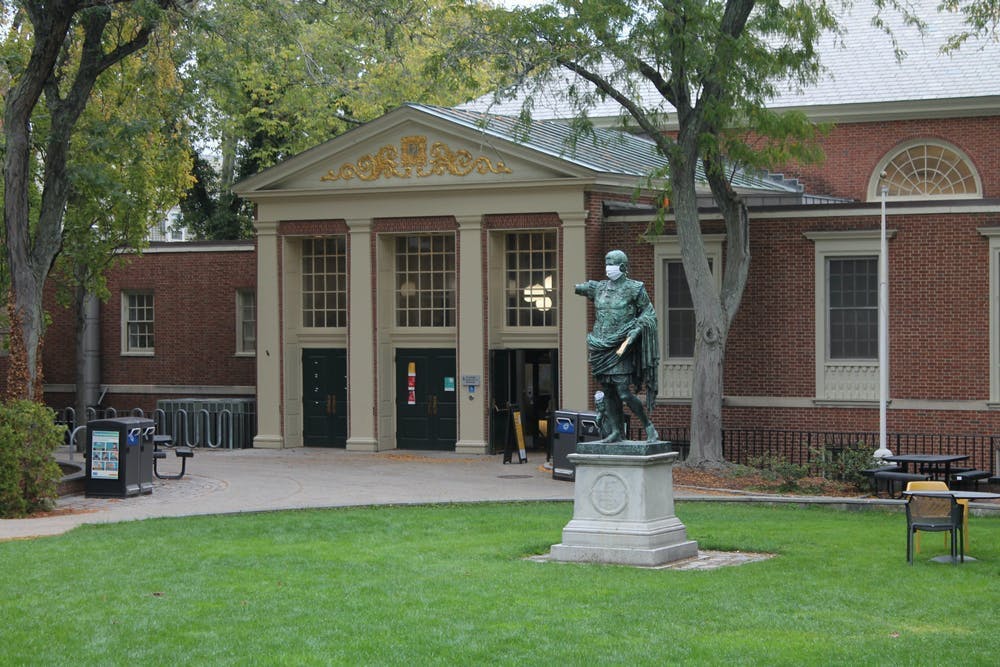A coalition of 18 student groups on campus urged the University administration to increase wages for Brown Dining Services workers and invest in hiring and new equipment, in a statement released Oct. 12. The coalition was formed in response to Herald reporting on understaffing and equipment shortages in dining facilities.
In the statement, the coalition of student organizations led by Brown Democrats wrote that “Currently, Brown Dining services staff members are enduring unacceptable working conditions that the University must immediately remedy. We commend the workers on their bravery for speaking out and reporting these conditions.”
Twelve Brown Dining Services workers previously interviewed by The Herald detailed the stress, exhaustion and frustration they feel working at various dining halls. Along with understaffing and equipment issues, dining workers alleged that supervisors were insufficiently attentive to staff concerns. George Barboza, director of Dining Programs, told The Herald that the administration is working on hiring new workers, but is facing difficulty filling vacant positions.
“This coalition understands the difficulties of reopening campus amid the COVID-19 pandemic,” the statement said. “Brown, however, should not be a workplace that does not respect its workers nor its students by requiring food preparation from overworked employees in unsafe conditions.” The statement concludes by calling upon the University to release a response and action plan for addressing the BDS staffing shortages and lack of equipment, and for increasing the workers’ wages.
University Spokesperson Brian Clark declined to comment on the formation of the coalition and its demands.
Matt Rauschenbach ’23, an executive board member of the Brown Democrats and contributer to the statement said that while disappointed by what he read in The Herald’s article, he was “not surprised” by its findings. Rauschenbach, who worked in the Blue Room when he was a first-year, said anyone who has been an employee of Brown Dining Services is already aware of systemic issues.
Jada Wooten ’24, a project leader for Students for Educational Equity, one of the student group that supported the statement, agreed that the revelation of these conditions was important in holding the University accountable to its responsibility to its dining workers. “I felt horrible that those are the conditions Brown workers are facing, but at the same time, reading it helped me piece together everything that is going on within the University,” Wooten said.
Rauschenbach and others involved with Brown Democrats wrote the statement and assembled the coalition of groups because they felt that students had a responsibility to speak up about the conditions in dining facilities. The idea for a statement was first raised by Brown Democrats, but Rauschenbach said he thought “that it would have more of an impact if we had more groups sign on, so we reached out to different organizations.” Rauschenbach said he told leadership of other student organizations, “If you read this and thought (that) these are not the types of conditions that workers at a multi-billion dollar endowed institution should be working in, we encourage you to sign on.”
Students for Educational Equity Co-President Zoë Fuad ’23.5 has been working with Rauschenbach and other student organizations advocating for improvements in Brown Dining Services working conditions. Her organization is “trying to build off the work that Brown Democrats have already started and work with them to see what is needed,” she said. “I think the end goal is ensuring that workers are appreciated and have student support. We hope to see better wages, better infrastructure and better working conditions overall.”
Fuad emphasized the importance of collaboration in SEE’s advocacy efforts. “Many of the systems of oppression we are facing happen to be interlocking and overlapping. A lot of social justice groups at Brown tend to share a lot of common goals and interests, and I think it’s really important (that) groups are not defined by a single issue and to recognize the connection between different movements.”
Raushenbach said that he has received many questions from other students about why the demands in the statement, like improving conditions and raising wages, are so vague. This was intentional, he said, in order to empower dining workers to lead efforts to improve conditions. “If you read the initial article, one of the workers … said once the students get involved is when the University seems to care,” he said. “We should be uplifting the issue, and (the dining workers) should be leading the specifics.”
Wooten added that the statement can be a launching board for other student activism around this issue. In the past, she said, the biggest changes on campus — such as adding air conditioning to the Ratty — resulted from student activism.
“I don’t want the University to placate students and think that we are going away,” Rauschenbach said, “because we’re not.”





